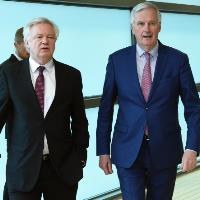(BRUSSELS) – The joint legal text presented Monday by EU and UK Brexit negotiators is a ‘decisive step’ towards an international agreement for Britain’s orderly withdrawal from the EU, said EU chief negotiator Michel Barnier.
Following negotiations that took place from 13 to 19 March 2018, EU and UK negotiators presented a version of the draft Withdrawal Agreement that shows the progress achieved so far in the talks.
This a coloured version identified the parts of the Withdrawal Agreement where both sides have agreed on the legal text, which include: citizens’ rights; financial settlement; transition period; and separation issues.
Not all issues have been solved, however, and much work still needs to be done on important topics, particularly Ireland and Northern Ireland.
Regarding the border between Northern Ireland and Ireland, the negotiators agreed that a legally operative version of the ‘backstop’ solution should be agreed as part of the legal text of the Withdrawal Agreement.
This solution would be in line with what was agreed in December 2017 in the Joint Report and would apply unless and until another solution is found, said M Barnier.
The results of the negotiations will be presented to the European summit this Friday, which is due to evaluate and judge the current state of the negotiations.
M Barnier said the joint legal text agreed on some key points. These included “complete” agreement on the legal translation of the agreed points in December on citizens’ rights and the Financial Regulation.
This, said M Barnier would provide reassurance to “the 4.5 million citizens, British and European, concerned and worried by Brexit. It is these citizens who have been our priority since the first day – and that of the European Parliament and the Member States.”
There would also be reassurance for “all carriers and beneficiaries of projects funded by the European budget during the period 2014-2020.”
For citizens, an additional option would offer the possibility of obtaining new residency status in the United Kingdom, from the beginning of the transition period.
And this option will allow citizens who so wish, to have immediate legal certainty on their right of residence after the transition period.
On the transition period, this would be of limited duration as desired by the UK Government and the EU. M Barnier confirmed that the UK would no be able to participate in EU decision-making as it will no longer be a Member State from 30 March 2019.
He confirmed that it would “retain all the advantages and benefits of the single market, the customs union, and European policies, and will therefore also have to comply with all European rules, just like the Member States.”
Also that British citizens and European citizens of the 27 who arrive during the transition period will enjoy the same rights and guarantees as those who arrived before Brexit Day.
The time of transition requested by the UK would be a useful time for British authorities, as well as British companies to prepare for the future. This would be particularly important for the UK to negotiate trade agreements with third countries.
The talks have also shown progress in some other areas, including the finalization of customs procedures, the circulation of products and their surveillance, the UK’s nuclear commitments and protection of European brands.
However, talks will continue on other issues of separation, in particular geographical indications, data protection and automatic recognition of judgements.



